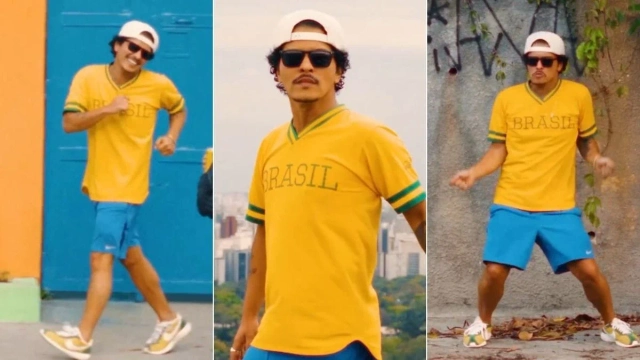Brazilian Funk
A comprehensive guide to the genre of Brazilian Funk music

1. What is Brazilian Funk?
Brazilian Funk, also known as Baile Funk or Funk Carioca, is a genre of music that originated in the favelas (slums) of Rio de Janeiro, Brazil. It combines elements of hip hop, electronic dance music, and traditional Brazilian rhythms.
- Origins and Evolution: Brazilian Funk emerged in the 1980s and 1990s, inspired by the sounds of Miami bass and hip hop. It developed into a distinct genre, with a focus on beat-driven tracks and lyrics that reflect the realities of life in the favelas.
- Influence of Hip Hop and Electronic Music: Early Funk Carioca incorporated hip hop's rhythm and rhyme schemes, while also integrating electronic dance beats, synthesizers, and samples from global genres. This fusion gave rise to a dynamic and evolving sound.
2. Cultural and Social Significance
Brazilian Funk plays a crucial role in reflecting and amplifying the cultural and social issues faced by the youth in Rio's favelas. It has become a voice for marginalized communities, often addressing themes such as poverty, violence, and resistance.
- Voicing Social Issues: Funk Carioca often reflects the challenges faced by those in Brazil's marginalized communities, from economic struggles to violence. Artists frequently use their music to tell stories of resilience and resistance.
- Funk as a Form of Empowerment: For many in the favelas, Funk serves as a form of cultural expression and empowerment. It provides a platform for youth to assert their identity and resist the dominant narratives of mainstream Brazilian society.
3. Key Artists and Contributors
The Brazilian Funk scene has produced numerous influential artists who have helped shape and popularize the genre, both domestically and internationally.
- MC Daleste: MC Daleste was one of the most iconic figures in Brazilian Funk, known for his powerful storytelling and addressing issues such as poverty and violence. His untimely death in 2013 left a significant impact on the scene.
- Anitta: Anitta is one of the most successful Brazilian artists internationally, who blends Funk with pop and other genres. Her collaborations with global artists have helped bring Funk to the global stage.
- Ludmilla: Ludmilla is another prominent figure in Funk music. Known for her versatility, she fuses Funk with reggae, pop, and other Brazilian musical styles, creating a fresh sound that resonates with young audiences.
4. Music and Production
The production of Brazilian Funk involves a distinctive blend of drum machines, synths, and samples. The beats are typically fast-paced, and the lyrics are delivered in a rapid-fire style, often with a heavy focus on rhythm.
- Beat-making Techniques: Brazilian Funk producers use electronic drum machines like the Roland TR-808 and TR-909 to create the signature bass-heavy beats. Sampling is also a key element, with producers often using snippets from funk, hip hop, and other genres.
- Collaborations with Other Genres: While Funk has its roots in the slums of Rio, it frequently incorporates influences from other musical genres, including samba, reggae, and pop, creating a dynamic and versatile sound that appeals to a wide audience.
5. Global Influence and Popularity
Although Funk originated in Brazil, it has garnered attention on the global stage, with collaborations, remixes, and festivals helping to spread its influence to other parts of the world.
- International Collaborations: Artists like Anitta, Ludmilla, and others have collaborated with international stars such as J Balvin and Major Lazer, bringing Brazilian Funk to audiences in the U.S., Europe, and beyond.
- Funk Festivals Around the World: Brazilian Funk has been featured in major international music festivals, such as Lollapalooza and Coachella, introducing the genre to new audiences across different continents.
6. Controversies and Criticism
While Funk has become one of the most popular music genres in Brazil, it has also faced criticism and controversy due to its explicit lyrics and associations with criminal activity in the favelas.
- Explicit Lyrics and Themes: Many Funk songs feature explicit lyrics that discuss topics such as sex, violence, and drugs. These themes have led to debates about whether Funk promotes or reflects negative aspects of society.
- Association with Crime: Some critics argue that Funk music is associated with criminal behavior, particularly given its origins in the favelas, where drug trafficking and violence are common. However, supporters argue that Funk provides a voice for the voiceless.
7. The Future of Brazilian Funk
As Brazilian Funk continues to evolve, it is becoming increasingly influential on the global music scene, with new artists and subgenres emerging, influencing not just Brazil, but the broader world of pop and electronic music.
- Innovations in Sound: Brazilian Funk artists continue to push the boundaries of sound, blending traditional Funk with genres like trap, reggaeton, and even pop-punk, expanding the genre's appeal to global audiences.
- Funk's Role in Brazilian Pop Culture: As Funk continues to grow in popularity, it is becoming an integral part of Brazilian pop culture. It influences not only music but also fashion, dance, and visual arts, making it a key cultural movement.
Summary
- Brazilian Funk, or Funk Carioca, is a genre that blends hip hop, electronic dance music, and Brazilian rhythms.
- It originated in the favelas of Rio de Janeiro and reflects the social and cultural issues of these communities.
- Artists like MC Daleste, Anitta, and Ludmilla have been key to the genre's growth and international success.
- Despite facing criticism for explicit content, Funk has become a powerful voice for marginalized groups in Brazil.
- Funk continues to evolve, influencing global music trends and shaping Brazilian pop culture.
References
- - Baile Funk: The Evolution of Brazilian Funk (Rolling Stone Brazil)
- - Funk Carioca: A Social Movement in Brazil (The Guardian)
- - Top Brazilian Funk Artists (Billboard Brazil)
- - Brazilian Funk Music Production (Electronic Music Journal)
- - Brazilian Funk's Global Reach (BBC)
- - The Controversy of Funk Carioca (The New York Times)
- - The Future of Brazilian Funk (MTV Brazil)
- - Funk Carioca: A Global Phenomenon (BBC Music)
keywords: Brazilian Funk; Baile Funk; Funk Carioca; Brazilian music; electronic music.
Partner Suggestion
Best Tips for Better Relationships
